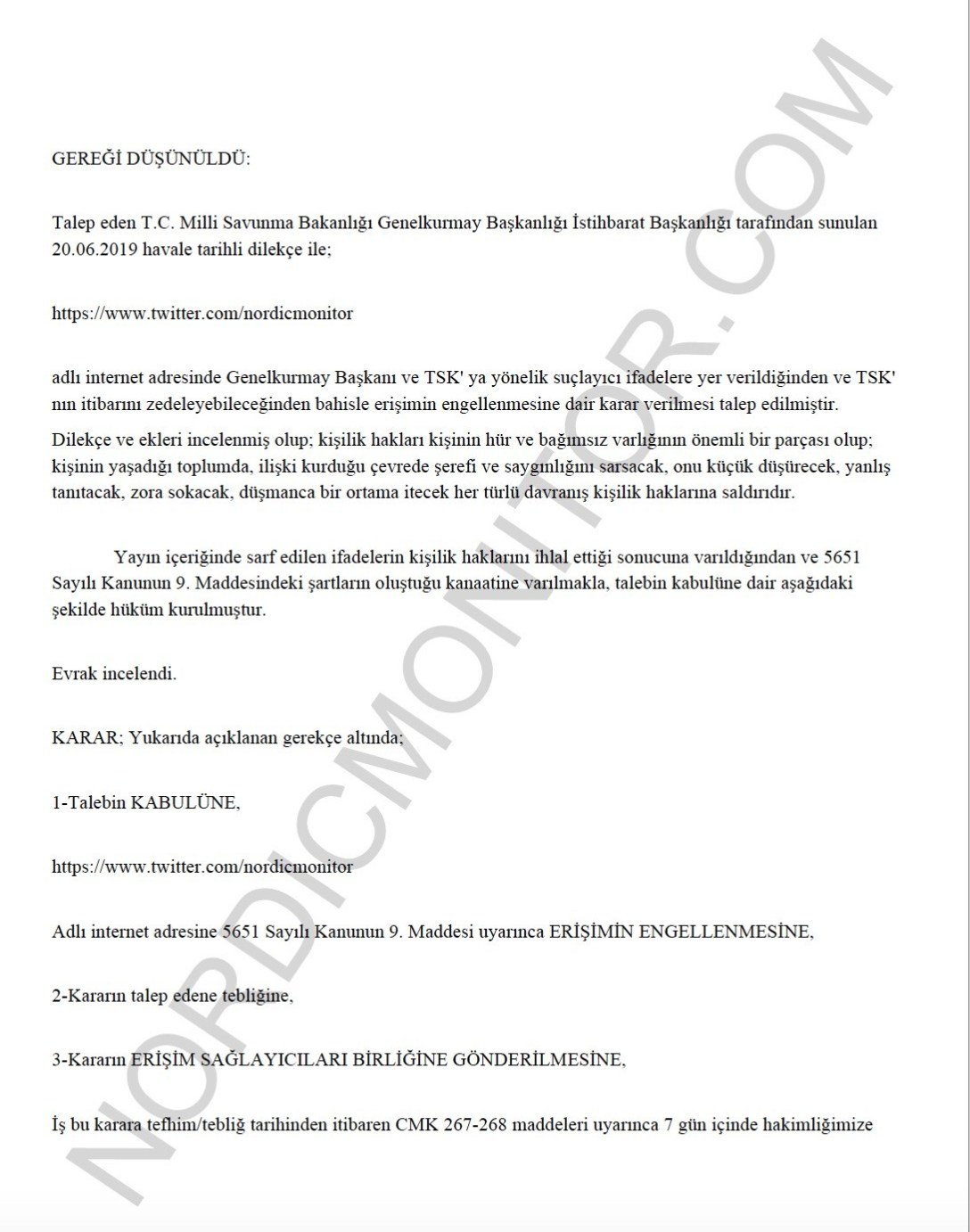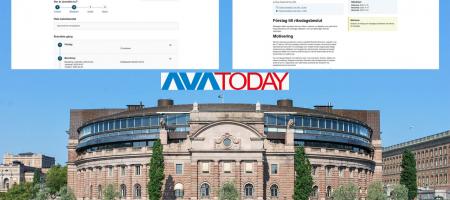
Abdullah Bozkurt, Nordic Monitor
Turkish military intelligence asked a Turkish court to block Nordic Monitor’s Twitter account, claiming that articles published by the Sweden-based news outlet could taint the reputation of the Turkish Armed Forces (TSK).
Ankara 6th Criminal Court of Peace Judge Mustafa Asefler granted the request the same day the complaint was filed by the TSK’s General Staff Intelligence Directorate and ordered the block of Nordic Monitor’s Twitter account on June 20, 2019. The judgement, numbered 2019/4855, was sent for enforcement to Twitter and Internet service providers in Turkey.
The complaint filed by the TSK came after Nordic Monitor had published classified military intelligence documents that exposed how the Turkish military spied on US and NATO ally troops deployed in Turkey while prosecutors were running secret criminal probes into US military personnel.

The Turkish judiciary became a tool in the hands of the Islamist government of President Recep Tayyip Erdoğan after a massive purge of over 4,000 judges and prosecutors on fabricated charges. The criminal justice system has often been abused by Erdoğan to persecute government critics, leading to the imprisonment of nearly 200 journalists, a world record. Some 180 critical media outlets were seized and shut down by the government in 2016, while many news websites were blocked in Turkey.
Twitter said it would not take any action on the judge’s order to block Nordic Monitor’s account for the time being. Most court orders asking the US-based Twitter to suspend, cancel or block users originate in Turkey.
According to Twitter’s Transparency Report covering the July 1, 2017-December 31, 2017 period, Turkey issued 466 court orders for removal requests, while the number for the rest of the world combined was 47. In other words, 91 percent of all censorship requests in the form of court judgements came from only one country, Turkey. This shows how the Turkish judiciary has been politicized and subordinated to the executive branch of government.

The latest Transparency Report, which covered the July 1, 2018-Dec. 31, 2018 period, showed Turkey issued 597 court orders for removal requests, which amounted to 52 percent of censorship requests worldwide in the form of court judgments and reinforced Turkey’s position as leader of the pack in the censorship campaign. Twitter enforced only 4 percent of the removal requests originating from Turkey in the same period.
Nordic Monitor has previously been hit with similar Turkish court judgements . On January 31, 2019 a court in Ankara ordered a block on Nordic Monitor’s story that exposed how the Turkish judiciary in January 2019 authenticated a leaked voice recording that revealed top Turkish officials debating a plot to stage a false flag incident in order to intervene militarily in Syria.
The decision to block Nordic Monitor’s Twitter thread was made by Judge Ali Keles of the Ankara 2nd Penal Court of Peace a day after the government of President Erdoğan filed a petition to that effect. The judge’s order cited “national security” as justification for his decision, which ordered Twitter to remove or block access to the content.
The article that was referenced on Twitter was titled “Turkish court authenticates audio that revealed spy agency MIT’s false flag in Syria,” published on Nordic Monitor’s website in January 2019. The article reveals how a Turkish court confirmed the authenticity of a leaked audio clip in which top-ranking Turkish officials are heard discussing the possibility of an intervention in Syria in a false flag operation conducted by Turkish intelligence agency MİT.
In the leaked recording, then-Foreign Minister Ahmet Davutoğlu, then-Foreign Ministry Undersecretary Feridun Sinirlioğlu, MİT Undersecretary Hakan Fidan and then-Deputy Chief of General Staff Gen. Yaşar Güler are heard discussing military operations in Syria in Davutoğlu’s foreign ministry office on March 13, 2013.
Fidan says in the recording: “If needed, I would dispatch four men to Syria. [Then] I would have them fire eight mortar shells at the Turkish side and create an excuse for war.”
Another incident in which a Turkish judge ordered a block against Nordic Monitor on Twitter took place when Nordic Monitor published an article on systematic failures and troubles with drones that were domestically manufactured by Turkish firm Baykar, whose owners include Selçuk Bayraktar, President Erdoğan’s son-in-law.
The revelations, documented in a classified Turkish military document, were published on May 11, 2019 and exposed how the government covered up problems with the Bayraktar drone system when ground data terminals frequently malfunctioned, with the problem resuming shortly after they returned to service following repair.
Erdoğan’s son-in-law never challenged the documents or the substance of the report, but instead he — through the Turkish president’s lawyer, Ahmet Özel — claimed in his legal complaint with the Istanbul 1st Criminal Court of Peace judge on May 17, 2019 that his rights had been violated.
Judge Mustafa Kolay issued his verdict on the same day under decision No. 2019/3966, agreeing with the plaintiff’s claim that the article contained statements insulting Bayraktar and as such his rights had been violated. The article identifies Erdoğan’s son-in-law only once as the chief technology officer for Baykar, which manufactures the drones.
The Turkish Internet Law was criticized for its shortcomings by the Council of Europe’s Venice Commission, which said in an opinion on June 15, 2016 that the law was not in line with European norms. “The only measure provided for in Law No. 5651 is the measure of access-blocking/removal of content which is the most severe measure possible on the Internet,” the commission emphasized. It added that “[the] Law does not provide for any other measure, less intrusive than blocking/removal, as for instance, requirement of ‘explanation’ from the interested party [content provider, website owner, etc.], ‘response’, ‘correction’, ‘apology’, ‘content renewal’, ‘access renewal’ etc.”
On January 11, 2010 the Organization for Security and Co-operation in Europe (OSCE) representative for freedom of the media published a report on the Internet Law recommending, on the basis of legal and procedural deficiencies identified, that the government urgently bring Law no. 5651 in line with international standards on freedom of expression or otherwise should consider abolishing the law.














